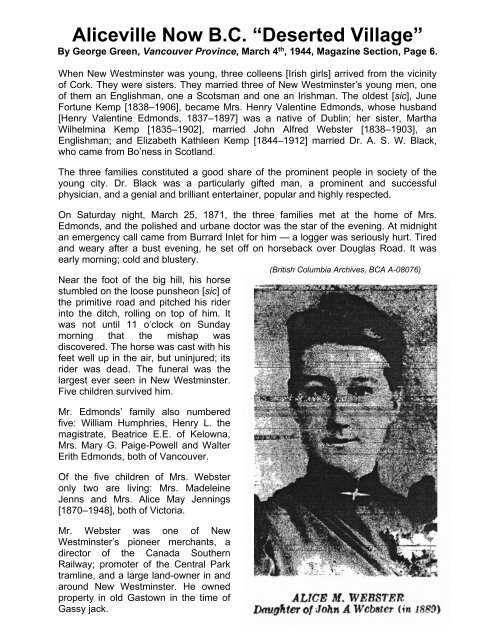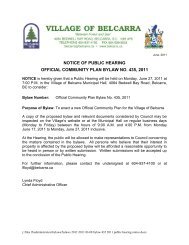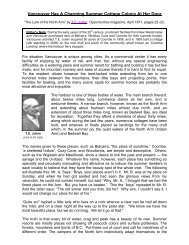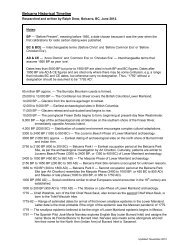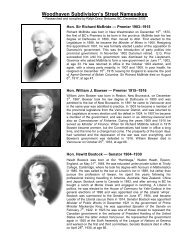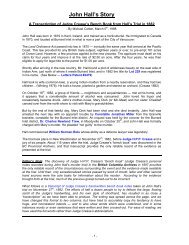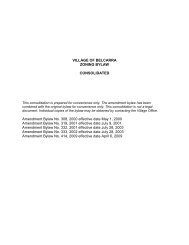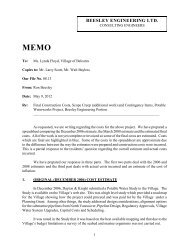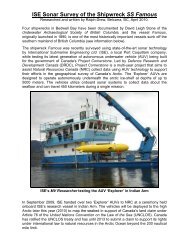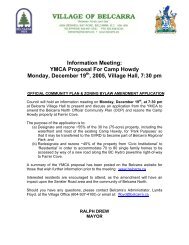Aliceville Now BC 'Deserted Village' - Village of Belcarra
Aliceville Now BC 'Deserted Village' - Village of Belcarra
Aliceville Now BC 'Deserted Village' - Village of Belcarra
You also want an ePaper? Increase the reach of your titles
YUMPU automatically turns print PDFs into web optimized ePapers that Google loves.
<strong>Aliceville</strong> <strong>Now</strong> B.C. “Deserted <strong>Village</strong>”<br />
By George Green, Vancouver Province, March 4 th , 1944, Magazine Section, Page 6.<br />
When New Westminster was young, three colleens [Irish girls] arrived from the vicinity<br />
<strong>of</strong> Cork. They were sisters. They married three <strong>of</strong> New Westminster’s young men, one<br />
<strong>of</strong> them an Englishman, one a Scotsman and one an Irishman. The oldest [sic], June<br />
Fortune Kemp [1838–1906], became Mrs. Henry Valentine Edmonds, whose husband<br />
[Henry Valentine Edmonds, 1837–1897] was a native <strong>of</strong> Dublin; her sister, Martha<br />
Wilhelmina Kemp [1835–1902], married John Alfred Webster [1838–1903], an<br />
Englishman; and Elizabeth Kathleen Kemp [1844–1912] married Dr. A. S. W. Black,<br />
who came from Bo’ness in Scotland.<br />
The three families constituted a good share <strong>of</strong> the prominent people in society <strong>of</strong> the<br />
young city. Dr. Black was a particularly gifted man, a prominent and successful<br />
physician, and a genial and brilliant entertainer, popular and highly respected.<br />
On Saturday night, March 25, 1871, the three families met at the home <strong>of</strong> Mrs.<br />
Edmonds, and the polished and urbane doctor was the star <strong>of</strong> the evening. At midnight<br />
an emergency call came from Burrard Inlet for him — a logger was seriously hurt. Tired<br />
and weary after a bust evening, he set <strong>of</strong>f on horseback over Douglas Road. It was<br />
early morning; cold and blustery.<br />
(British Columbia Archives, <strong>BC</strong>A A-08076)<br />
Near the foot <strong>of</strong> the big hill, his horse<br />
stumbled on the loose punsheon [sic] <strong>of</strong><br />
the primitive road and pitched his rider<br />
into the ditch, rolling on top <strong>of</strong> him. It<br />
was not until 11 o’clock on Sunday<br />
morning that the mishap was<br />
discovered. The horse was cast with his<br />
feet well up in the air, but uninjured; its<br />
rider was dead. The funeral was the<br />
largest ever seen in New Westminster.<br />
Five children survived him.<br />
Mr. Edmonds’ family also numbered<br />
five: William Humphries, Henry L. the<br />
magistrate, Beatrice E.E. <strong>of</strong> Kelowna,<br />
Mrs. Mary G. Paige-Powell and Walter<br />
Erith Edmonds, both <strong>of</strong> Vancouver.<br />
Of the five children <strong>of</strong> Mrs. Webster<br />
only two are living: Mrs. Madeleine<br />
Jenns and Mrs. Alice May Jennings<br />
[1870–1948], both <strong>of</strong> Victoria.<br />
Mr. Webster was one <strong>of</strong> New<br />
Westminster’s pioneer merchants, a<br />
director <strong>of</strong> the Canada Southern<br />
Railway; promoter <strong>of</strong> the Central Park<br />
tramline, and a large land-owner in and<br />
around New Westminster. He owned<br />
property in old Gastown in the time <strong>of</strong><br />
Gassy jack.
In 1874 he received a crown grant <strong>of</strong> 160 acres <strong>of</strong> land on the eastern side <strong>of</strong> the North<br />
Road beside Burrard Inlet. This was a beauty spot, giant maples threw a delightful<br />
shade over a wide green sward, and the fresh tang <strong>of</strong> the evergreen forest which<br />
hemmed in the open clearing at the end <strong>of</strong> the road mingled with the salt sea breezes<br />
which swept up from the ocean whose rolling waves beckoned enticingly.<br />
Yachting and boating, swimming and bathing under conditions that excluded the<br />
general public — isolated yet close at hand from the city, it was natural that here many<br />
picnic parties should enjoy the leisure to the full. Naiads and water nymphs disported in<br />
clear limpid waters, in “such a tide as moving, seems asleep”, a pleasing contrast to the<br />
turbid and swirling Fraser, beside the city.<br />
Mr. Webster, the opulent landowner, built a hotel to house his guests. A second hotel<br />
appeared on the west side <strong>of</strong> the road [North Road]. Its owner was Mr. [John] Johnston,<br />
K.C., <strong>of</strong> New Westminster.<br />
Families cam to spend months at a time, guests at either <strong>of</strong> the up-to-date hotels or to<br />
camp in the individual cabins along the shore. Mrs. Jenns and her family <strong>of</strong> young<br />
children were frequent visitors and her sister, Miss Alice May Webster [b.1870], was the<br />
belle <strong>of</strong> the place.<br />
(British Columbia Archives, <strong>BC</strong>A I-66415)<br />
It was in the early eighties [1880s], sixty<br />
years ago. Canada’s transcontinental<br />
was coming to Port Moody. Mr. Webster<br />
sold his holdings at Granville and<br />
bought heavily at Port Moody. Had not<br />
Sir Charles Tupper. The minister <strong>of</strong><br />
railways, told the House <strong>of</strong> Commons<br />
that Port Moody was to remain the<br />
Pacific terminus<br />
But in 1884, the railway made a deal<br />
with Premier Smythe at Victoria for<br />
terminal facilities at Coal Harbour.<br />
Webster obtained an injunction<br />
forbidding the extension. His opponents,<br />
however, were too powerful and soon<br />
the injunction was dissolved by the<br />
same court which had granted it. In May<br />
1887, the first transcontinental train<br />
passed the pleasant homelike summer<br />
camp on its way to Vancouver.<br />
For some years the camp continued<br />
with these three families and their<br />
friends, together with those <strong>of</strong> Mrs.<br />
Johnston, to enjoy their outings.<br />
The era <strong>of</strong> the scant bathing suit had<br />
not yet arrived, but the sedate eighties<br />
had given place to gay nineties. Gaudy<br />
flower gardens adorned immense hats
with trailing ostrich plumes and stuffed birds. The crinoline and the bustle were gone<br />
and the cyclist sported the bloomer and the leg-o-matic …….<br />
Mrs. Webster decided that a railway station was desirable for the yet unnamed spot<br />
and, with his younger daughter called on his old acquaintance, H.H. Abbott, the railway<br />
superintendent. He agreed that while local traffic might not warrant the stopping <strong>of</strong> the<br />
transcontinental express, a flag station was not out <strong>of</strong> place.<br />
“Have you any preference as to the name” “Call it after this young lady, my daughter<br />
Alice.” And so it became <strong>Aliceville</strong>.<br />
Today [1944] nothing remains <strong>of</strong> <strong>Aliceville</strong> except the maples and the sea. Andy<br />
Richardson’s gas station retails gasoline for the horseless buggy, and oil refineries<br />
stand on either hand. Like Goldsmith’s deserted village it has completely disappeared,<br />
and more than half a century has passed since it flourished by the sea.<br />
(British Columbia Archives, <strong>BC</strong>A A-08070)
British Columbia Archives (<strong>BC</strong>A B-00493).<br />
Webster’s Hotel, <strong>Aliceville</strong>, Burrard Inlet, 1887.<br />
Hopeful colonists <strong>of</strong> an early era, when <strong>Aliceville</strong> was on the map — and this was about all the population.<br />
Standing, from left to right, Dr. De Wolf Smith, New Westminster, Nellie Homer (Mrs. R. Eden Walker,<br />
Kelowna); May Homer, Mrs. Falding (née Homer); boy with arms around post, A. B. Homer; S. A. Jenns,<br />
J. S. Gaynor, Alice May Jennings (née Webster), Victoria; Mr. Falding, Margie Homer, A. B. Webster,<br />
Kathleen Black (Mrs. H. H. Watson, Vancouver); seated, Mrs. De Wolf Smith, Mrs. Gaynor, California,<br />
holding Homer Falding on her knee; Edith Wilson (Mrs. Charles Hamilton), Nelson; Edith Horton, Alice<br />
Homer (Mrs. E. A. Greame), Mabel Falding; children seated on ground, Ethel Homer, New Westminster;<br />
not known; and Helen Falding. The man standing to the left <strong>of</strong> the post under the sign “<strong>Aliceville</strong>” and<br />
having his back to the camera, is not identified.<br />
Mainland Guardian, April 4 th , 1883.<br />
Burnaby Historical Society (BHS 421-001).<br />
Johnston’s Hotel, <strong>Aliceville</strong>, 1892.


